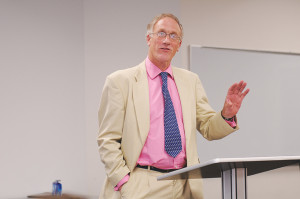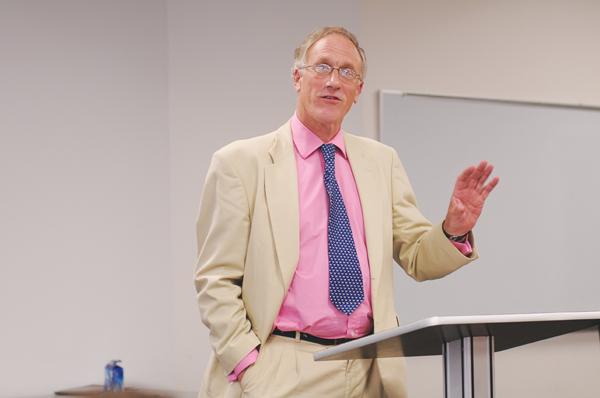
SMU’s Maguire Center and the Division of Journalism welcomed British Parliament Member Julian Brazier Thursday. He spoke about one of the most important and current questions in international relations — Syria. He also provided views of the U.S. from outside the country’s borders.
It was not Brazier’s first time on the SMU campus and also not his first introduction to SMU students.
“Julian [Brazier] has been a great friend of SMU,” Journalism Chair Tony Pederson said in his introduction, noting Brazier is also an “expert on the history and rise of fundamental Islam.”
Brazier has also had a very active and vocal role in the unfolding of the Syrian conflict. Britain’s decision to not commit to military attack in joint with the U.S. is one Brazier strongly supported.
“If the enemy decides to raise the anty [on an initial strike]…then you’ve got to be willing to raise it too,” Brazier said.
“I was one of the ones who was very concerned as to whether or not there was a coherent game plan. The enemy gets a vote too. You can’t simply commit yourself to a limited strike.”
However, Brazier insisted that contrary to Britain’s current state in the affairs, “the securing of a U.N. motion…cannot be the absolute requirement.” He said “the best way to solve [Syria] is through negotiation…[which] now, by a very strange route, has taken place.”
Despite Britain voting against Syrian attack, Brazier attributed America’s ability to engage in the recent viable negotiations to the fact that the U.S. is in a place to threaten legitimate armed power.
“[The negotiations] are only made possible by the fact that [the U.S.]…has both the ability and the will to move forward with military action,” Brazier said. “[There needs to be] more dialogue, less threats, but that doesn’t mean you want to disarm.”
The most important concern Brazier sees now, though, is not whether military action should or should not happen. His concern is the more than two million Syrians who have become “cross-border refugees” in neighboring Jordan and Lebanon.
“It’s destabilizing,” Brazier said about the massive influx of refugees. “We’ve got to get massive aid into Jordan and Lebanon [and] we’ve go to get military aid in…on a larger scale.”
Brazier shared his view on American decisions in international affairs — a view not only shared by many of his fellow members of Parliament, but also much of the Middle East.
“Increasingly, the Islamic countries are seeing America as the enemy,” Brazier said.
This creates difficulty in situations such as Syria when the U.S. seeks international support for military action in a region already struggling with the balance of U.S. aid and U.S. interference.
“There are other people who are powerful too,” Brazier said, specifically noting the web woven between the U.S., Russia and the Middle Eastern states, “and there has to be a feeling that you have to carry [these strong players]
with you.”









